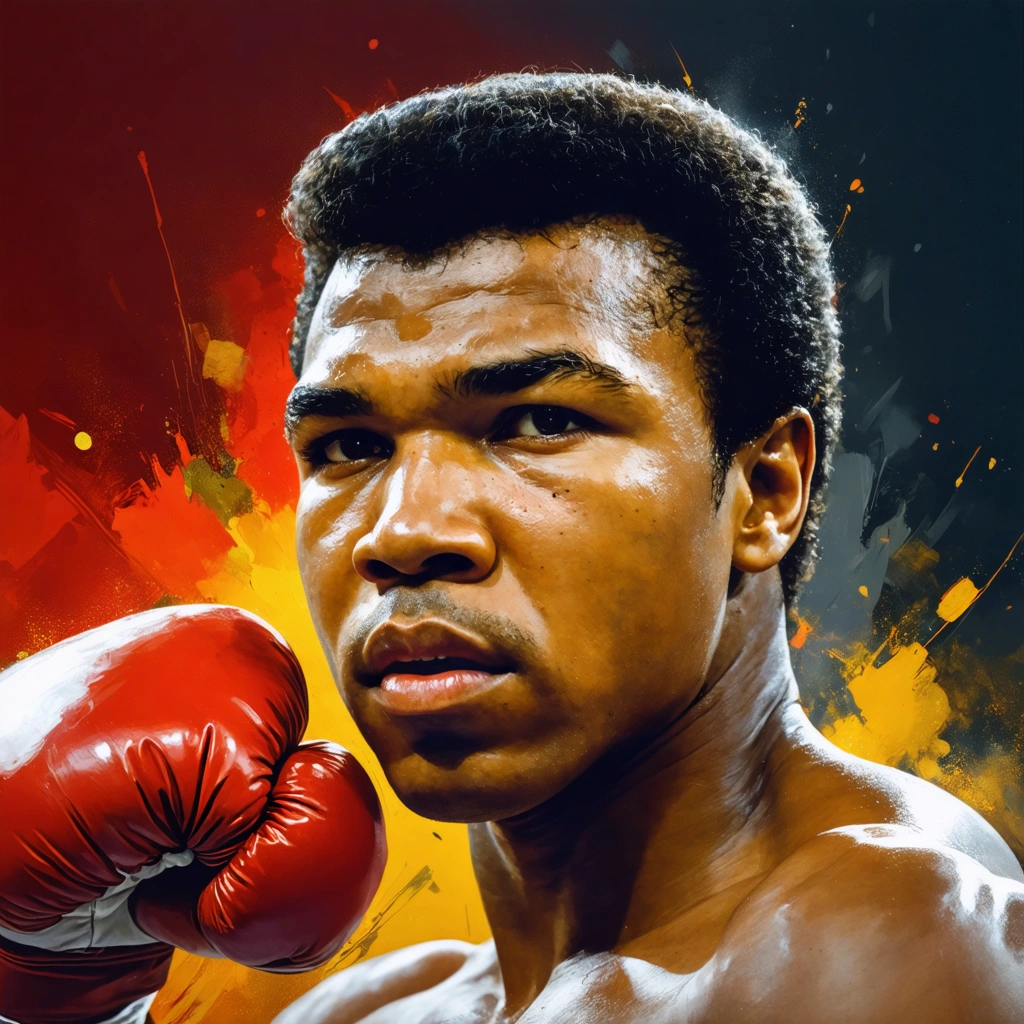
Introduction: A Legacy Carved in Time
Muhammad Ali was not only one of the greatest boxing champions in history, but also a loving father whose legacy continues through his nine remarkable children. The journey of Ali’s blended family, shaped by his four marriages and diverse relationships, tells an inspiring story of resilience, commitment, and a dedication to social causes. This article delves into the lives of all nine children—Maryum, Miya, Rasheda, Jamillah, Khaliah, Muhammad Ali Jr., Hana, Laila, and Asaad Amin—and explores how each of them carries forward the values of love, strength, and advocacy that their father stood for.
Foundations of Family Values and Resilience
The Principle of Unconditional Love
Muhammad Ali consistently emphasized the importance of family unity even amidst his global commitments. Despite his career challenges and the physical toll of his disease, Ali made it a priority to nurture a close bond among his children. Family reunions, especially at his iconic training camp, were essential to him, symbolizing strength in unity and the sharing of values that guided his professional and personal conduct. These gatherings became a cornerstone for the children, instilling in them not only respect for their father’s legacy but also an intrinsic drive to make meaningful contributions in their respective fields.
Impact of a Blended Family
Navigating a blended family is never simple, yet Ali’s approach managed to merge diverse backgrounds into a unified force. Each child grew up in a uniquely diverse environment, benefiting from the life lessons drawn from the intersection of varied maternal influences and their father’s larger-than-life persona. The lessons learned from overcoming early challenges—whether it was dyslexia, struggles with bullying, or personal battles—fueled the drive in each child to work relentlessly toward social advocacy. This multifaceted education enabled them to bridge barriers and build identities that resonate with themes of justice, social responsibility, and personal growth.
Profiles of Muhammad Ali’s Children
Maryum “May May” Ali
Maryum, the eldest, has dedicated her life to social work, particularly in raising awareness for Parkinson’s disease—a cause close to her heart after witnessing her father’s own battle. Initially exploring creative fields like comedy and rap, her pivot to social advocacy reflects a commitment to using her platform for public benefit. For over 15 years, her work in juvenile delinquency prevention and youth development has cemented her role as a community leader who follows in her father’s footsteps. Public appearances, coupled with literature contributions like her children’s book, illustrate how Maryum intertwines personal history with meaningful community service.
Miya Ali
Born with challenges that set her apart, Miya’s experience with dyslexia and bullying did not deter her ambition. Instead, Muhammad Ali’s dedication to spending quality time with her—by visiting schools and engaging with her environment—reinforced her belief in overcoming limitations. Miya’s later role as a brand ambassador for her sister Laila’s lifestyle brand demonstrates her ability to pivot from personal struggles to actively promoting awareness and empowerment. Her life journey remains a testament to how personalized nurturing shapes leaders who continue to impact social narratives.
Rasheda and Jamillah Ali
The twin sisters, Rasheda and Jamillah, have been instrumental in preserving and promulgating their father’s legacy. Rasheda, an advocate for Parkinson’s disease awareness, authored a guide aimed at helping children understand the complexities of the disease—a cause that is both personal and universal in its impact. Her public presence in docuseries and interviews has furthered the conversation around her father’s battle and the resulting dedication to charitable work. Jamillah, with a degree in mass communications and an intense involvement in community fundraising, reflects how the values instilled by Ali continue to ignite efforts in charity. Their combined efforts, including family reunions at original training sites, symbolize the union of historical legacy and modern social commitment.
Khaliah Ali
Khaliah has forged her own path in the fashion industry, combining creativity with business acumen. Memories of growing up around a vibrant training culture, often recalled as fond family anecdotes, helped shape her identity as a professional. Her recognition extends to public honors and awards alongside her husband, emphasizing that the spirit of activism and community service remains at the heart of every endeavor she undertakes. Her story of balancing personal pursuits with a commitment to familial legacy illustrates how tradition and innovation can merge seamlessly.
Muhammad Ali Jr.
Muhammad Ali Jr. has embraced challenges head-on, transforming personal struggles with issues like drug addiction into a platform for advocacy. His establishment of the Muhammad Ali Legacy Continues organization reflects a proactive stance on social issues such as anti-bullying and self-defense education. With a vision that spans continents, his work in establishing foundations in the United Kingdom shows an impressive global outreach, encouraging dialogues that promote health awareness among minority groups. His challenges have only strengthened his resolve to be a living extension of his father’s ideals.
Hana Ali
Hana, the youngest born to Ali and his third wife Veronica, has contributed significantly as an author and media personality. Her memoirs and various documentary features bring forward anecdotes that capture the compassionate side of her father. The emphasis on stories of love, loss, and forgiveness highlights how personal narrative can yield insights into broader societal themes. Today, Hana continues to lend her voice to projects that communicate resilience, emphasizing that every challenge provides an opportunity for personal evolution.
Laila Ali
Perhaps one of the most notable among Muhammad Ali’s children, Laila’s journey from facing initial resistance to ultimately excelling in a career in boxing, exemplifies transformative perseverance. After embarking on a successful trajectory that saw her retire undefeated, Laila transitioned into business and entrepreneurship with the establishment of Laila Ali Lifestyle, a brand rooted in health and wellness. Her victories in the ring and in the boardroom symbolize the duality of strength and softness that defined her father’s ethos. Parenthood and multiple public appearances further attest to her multifaceted persona, blending athletic excellence with modern lifestyle influence.
Asaad Amin
Asaad, the adopted son, rounds out the narrative of Muhammad Ali’s family legacy. Raised on a farm in Michigan, he carved a niche in the world of sports management and multimedia content production. Representing the youngest generation of the Ali family, Asaad’s path in collegiate coaching and professional sports underscores a commitment to evolving the legacy from athletic performance to educational and community advancement programs. His personal reflections on his father’s influence echo across his professional endeavors, proving that lessons of love and determination can transcend all boundaries.
Legacy and Future Prospects
Muhammad Ali’s children have taken diverse routes to embody their father’s spirit. From social advocacy and community work to athletic achievements and entrepreneurial ventures, each child reflects elements of his charismatic legacy. Their paths illustrate how deep-rooted family values can ignite change across multiple sectors. Business leaders, educators, and cultural influencers alike find inspiration in their individual stories—testaments of a life lived with purpose and the importance of cherishing one’s roots. The legacy of Muhammad Ali is not confined to a single dimension; it spans across sporting triumphs, community service endeavors, and social justice movements. Each of his children, through their accomplishments and ongoing projects, contributes a chapter to this multifaceted narrative. Their combined efforts remind us that while history remembers the champion in the ring, the enduring power of love, resilience, and advocacy lies out in the world—propelled by the next generation inspired by one of the greatest icons of modern times. In conclusion, the story of Muhammad Ali’s nine children offers a unique perspective on the confluence of personal tragedy, triumph, and dedicated commitment to societal progress. Their varied pursuits—whether playing a role in social advocacy, engaging in competitive sports, or running successful business ventures—maintain the spirit of a legend whose impact goes far beyond the boxing arena. This diverse family, united by the threads of their father’s values, continues to inspire current and future generations to pursue excellence, justice, and visionary change.




